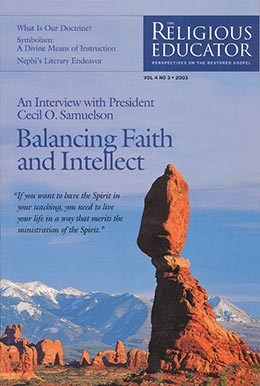Balancing Faith and Intellect: An Interview with President Cecil O. Samuelson
R. Devan Jensen
Devan Jensen, "Balancing Faith and Intellect: An Interview with President Cecil O. Samuelson," Religious Educator 4, no. 3 (2003): 1–13.
Devan Jensen was executive editor at the Religious Studies Center when this was written.
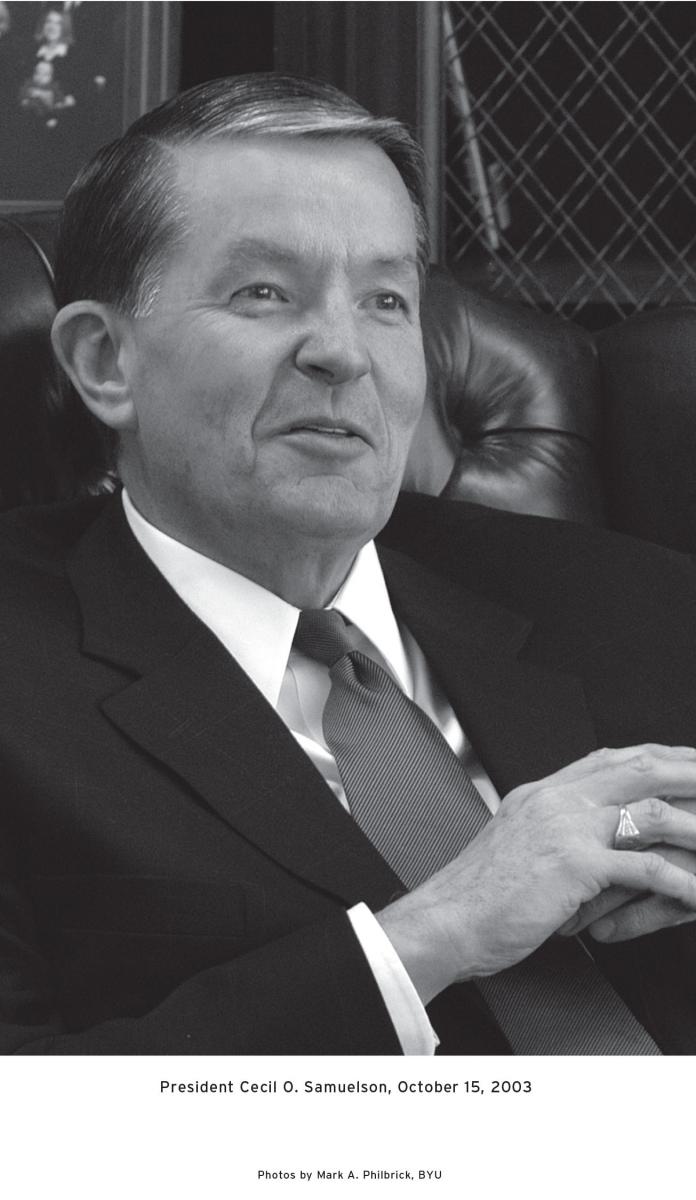 President Cecil O. Samuelson, October 15,2003. Photo by Mark A. Philbrick, BYU
President Cecil O. Samuelson, October 15,2003. Photo by Mark A. Philbrick, BYU
Balance seems to be the best word to characterize the service of President Cecil O. Samuelson. Over the years he has juggled many challenging demands, serving as a father, medical doctor, university professor, health-care administrator, member of the Presidency of the Seventy, and Sunday School general president. Now, with characteristic enthusiasm, he steps into his new role as the twelfth president of Brigham Young University, the first physician to hold this office.
President Samuelson, tell us a little about your teaching background and service as Sunday School general president. How did that open your mind to the role of teachers in the Church?
I don’t know that it dramatically opened my mind about teachers in the Church. I have been interested in teaching for a long time. My mother was a teacher. My father was a teacher and a professor. Both of my sisters have been teachers and one a professor as well. Both of my brothers were teachers. So education has been an important part of our lives.
When I was an undergraduate university student, I was a Sunday School president. I recognized that there was a great deal of responsibility for teaching. Only recently has the Sunday School again been given the responsibility for improving the quality of teaching. I hope that it is a positive step, and I hope I had a little bit to do with that. It was important for several reasons. One is that given the changes that have occurred in the Sunday School over the years with the block schedule and the other related things, the Sunday School presidency does not have quite the scope of responsibilities they used to have with opening exercises, song practices, or two-and-a-half-minute talks and those kinds of things. Likewise, in much of the developing world where leadership sometimes is a little thin, we do not have strong leaders in the Sunday School, and branch presidents, bishoprics, and others have sometimes taken over the responsibility for all the teaching. I have been very concerned about the quality of teaching in the Church for years—not because of bad teaching but because of the concern we had that the teaching be as good as it ought to be. I think that over the years we have seen some dramatic improvements in the curriculum, in the materials available for teachers, and in teacher-preparation materials. I think we are now in the situation where we have some wonderful teachers who are doing a superb job, but we still have a few who are not reaching their potential. We still have a way to go, I think, to upgrade our teaching and frankly to “enthrone” teachers as important as I believe they are.
If you were to offer some general advice for teachers, whether at a Church-sponsored institution or in local wards or branches, to help them teach with the Spirit or make an impact on people’s lives, what would you suggest?
Let me offer two or three suggestions. First, as President Harold B. Lee and others have said, including our current prophet, if we are going to lift people, we have to stand on higher ground. A teacher’s life has to be in order. If you want to have the Spirit in your teaching, you have to live your life in a way that merits the ministration of the Spirit. That means you have to get the distractions out of your life. It means that if you have unresolved issues, you need to repent. It means that you need to be living in such a way that the Holy Ghost will find you to be a welcome receptacle.
Second, preparation for teachers is very important. I have a good friend who tells me that the quality of the instruction of his high priests group depends on how many verses of the opening song they sing in priesthood meeting—meaning, did the instructor arrive unprepared, go through the manual, and then stand before the group? I think that preparation is very important. The teacher needs to have command of the material.
Third, there are some things that the teacher is and some things that the teacher is not. One of the things that a teacher should not be is a performer. Teachers who are focused more on drawing attention to themselves than the materials will not succeed to the degree that they should. We all know of people who are very charismatic, who can draw big crowds, and who are wonderfully entertaining. And while that is not necessarily bad, I am concerned that it may draw attention away from the subject material. Particularly in the Church, we are talking about a curriculum that is approved by the Brethren with the use of the scriptures in Sunday School. We use the teachings of the presidents of the Church in priesthood and Relief Society. Those are very important resources, and the focus of teachers ought to be on the topics and the students, not on themselves.
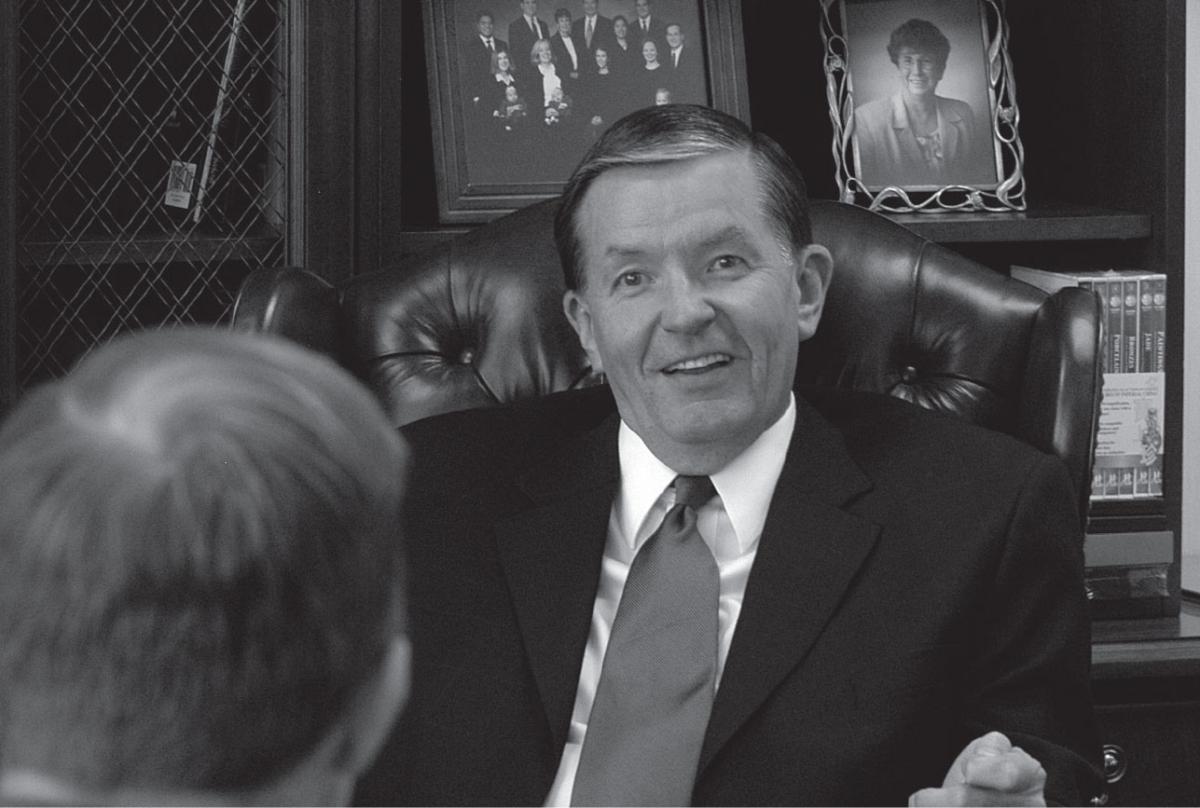
One of the things I learned very early is that good teachers not only are fairly articulate in their ability to express ideas and to share information but also are good listeners. I am a physician by background. In the particular area where I work, much of my effort is focused on diagnostics, to really understand what is happening. Much of my effort has been focused on teaching patients how to deal with their problems, the kinds of things they ought to do. I think much of that is analogous to teaching in a classroom at the university, the Church, or wherever you are. To be an exceptional teacher, you need to be a very good listener. It is understandable but sometimes regrettable that teachers are overly concerned about their appearance or their performance or about getting through all the material or being creative or being innovative or all the other things that people seem to try to do. I think one of the common mistakes made is to forget that an important role is to listen very carefully to students—what is going on in the discussion, what is not being said as well as where the students are in their level of understanding. Are they being polite and quiet? Are they being reflective? Are they being prompted and taught by the Holy Ghost? I think the Holy Ghost will help teachers with all of those questions. But it means that teachers have to be active and intent listeners. So, yes, preparation is important; knowing your topic is important; but listening, reflecting, empathizing, and relating are also important characteristics of teachers.
If you were to give advice to a brand-new seminary teacher or a brand-new Gospel Doctrine teacher, what would you say in terms of balancing schedules and reaching the hearts of the students?
Let me make one comment about balance. By definition, something that is perfectly balanced does not move back and forth. Second, living a balanced life does not necessarily mean you do everything the same every day. For example, we applaud those who live a missionary schedule—who are up at 6:30 a.m. and who are in by 9:30 p.m., who do all the things they do all day, the prescribed study and all of those important things. The principles you learn in terms of discipline and order and all the rest are the same, but most of us cannot, and in my view, should not live the schedule of a full-time missionary all our lives. There are times when we should. There are times when we are involved in other things.
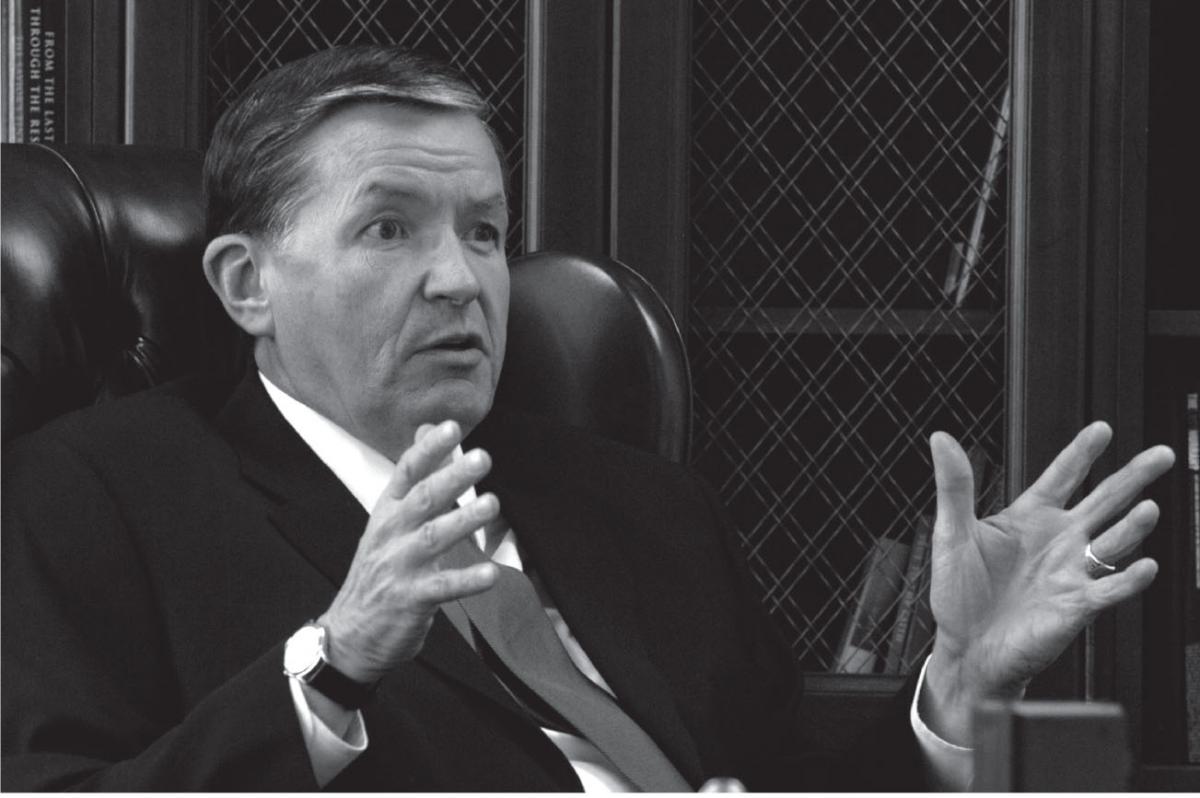
In part of my training I was an intern. Training in medicine is a little more humane than it used to be, but it is still very, very intense. If you were to try to carve as much time for gospel study out of every day as you did when you were a full-time missionary, most of the time it would be very difficult and sometimes it would be impossible. Likewise, when I served as a bishop or a stake president, it was not nearly as easy to find reflective time and time for independent study as it was when I was a Gospel Doctrine teacher. That was one of the wonderful blessings of being a Gospel Doctrine teacher for short periods a couple of times in my life. I have had only a chance to do that a little bit. I could spend roughly the same amount or much less time studying the gospel, thinking about how to share ideas, wondering what would be most important, praying, pondering, and fasting sometimes, and doing all those things. I was able to give much greater intensity than when much of life was occupied with administrative duties.
Balance is very important. I would come back to the question about the new seminary teacher by stating that what teachers are doing is very important, but it is important not only in the context of what it means to the students in the classroom but in what it means in their lives. Therefore, if I were counseling a new young seminary teacher, I would say, “Be sure your life is in balance and that things are in order.” Most of our young seminary teachers are newly married with young families; that needs some time. Because they are active and faithful in the Church, they most often have Church callings; that needs some time. Because they are coming into Church education, all of them need to be honest with their employer. And so teachers need to find a way to balance all of those kinds of things.
Recognize that all teachers do in seminary and institute—and it should be the aim of all education—is focused on the students. What is it that really blesses the students’ lives? Is it to discipline them? Is it to bore them or anesthetize them? Is it to inspire them? Is it to help them feel the Holy Ghost? Is it to increase their understanding of gospel doctrine and basic principles to increase their love for the scriptures? Most of the answers would be yes; some of those would be no. I think if we are constantly focused on the students—pondering about them, thinking about them, praying about them and for them—then we will know what it is that we should do. Most of us who have been in the classroom have our own unique characteristics and styles.
One of the best pieces of advice I had when I became a General Authority was to be yourself. Do not try to imitate anyone else. If you try to be like Elder So-and-So or somebody else, you will not be able to; you will fail. I thought about that as I came to BYU and thought of my eleven illustrious predecessors. I can think of things or ways that each of them has greatly exceeded my talents and capacities. While I am very humbled by that and worried that I do not shortchange the students and the university, I do not feel the need to compete with any of them on any of those grounds. I do feel the need to be my best self. I do feel the need to try to analyze carefully what the university needs at this time in its history or what the students need at this time in their course work. I am satisfied that if I do my very best, the Lord and the Holy Ghost will help me be successful in the eyes of the students. I think that applies for a new seminary teacher as much as it does for an old university president.
You have been serving as president of BYU for a few months. Do you have a new vision of where the university should be heading? Do you have a particular mission the university should achieve?
Well, people sometimes ask that question. Let me just say that BYU is a unique place and probably less influenced by the proclivities and preferences of the president than most other places. I think that the Brethren expect the Seventy to be largely interchangeable. In fact, President Merrill J. Bateman and I exactly traded jobs. I think there is probably a message in that someplace. And so I would say that I do not believe that I have a new vision as much as I have an expanded vision and an expanding vision of BYU.
I have watched BYU with great interest and mainly admiration most of my life. I grew up in Salt Lake County, but the fact that I was not a student here does not mean that I wasn’t aware of BYU. I watched it and participated in various ways on the campus. It is clear to me now that I am involved in thinking about BYU constantly rather than episodically and casually, that I’m having an expanded vision of what it is that the Brethren and the Lord intend for BYU. They want it to be the very best university it can be—to be the light on the hill that demonstrates that a university can be absolutely excellent academically without compromising in any way and can be excellent in enlarging and strengthening the faith and testimonies of our students. I am absolutely convinced that these missions are not only complementary—they are not competitive—but they really are synergistic. In other words, our spirituality can be better than it ever could be because we encourage people to think, to study, and to learn, and we help them do that with great academic distinction and great academic capacity.
You might say that is not particularly new. It is not new, but it is enlarged for me. In my inaugural remarks, I made reference to the charted course. I did that for a couple of reasons. One is that those who know the history of Church education would know that was the term President J. Reuben Clark used in the 1930s when he gave strong words of counsel at the university. He also used that term for seminary and institute teachers. So for those who would be sensitive and would be knowledgeable of that history, they would say, “Okay, steady as she goes; we are still committed to the notion of academic excellence with an absolute commitment to the reality of our Father in Heaven and His Son, Jesus Christ, the Restoration of the gospel through the Prophet Joseph Smith, and all that it entails.”
As President James E. Faust has said, the gospel is not a smorgasbord. We do not go through and pick out things we like and leave the things we do not like. We accept it all.
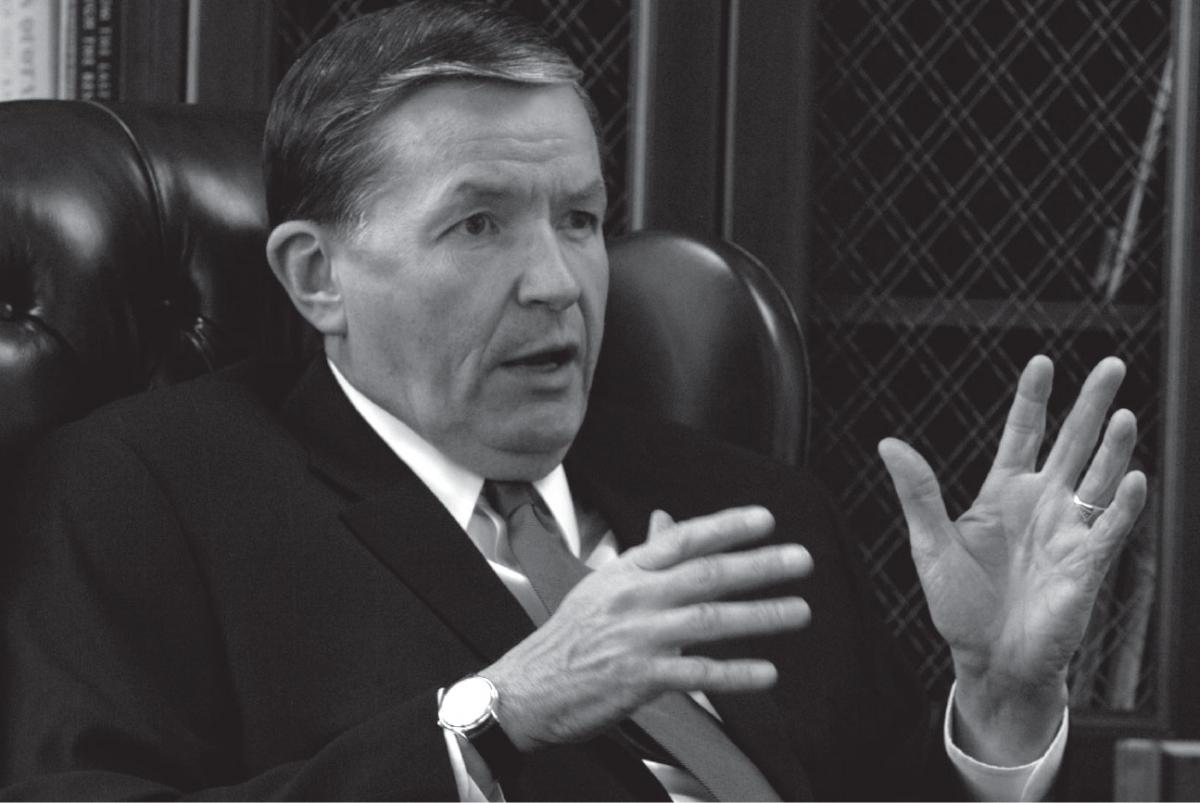
That is the charted course here at BYU. In recent years, others have written down the mission statements and the aims and objectives, and those have been published. As you know, I spent a considerable amount of time in my August university conference address quoting directly from those documents, not because I felt that others necessarily needed to be reminded, although I think all of us do, but so that I could make an affirmative statement that (a) I knew and understood them, (b) I endorse them, and (c) they would be the measures by which we would judge what it is we do and do not do here.
What part does religious education play at BYU?
Well, religious education at BYU is quite unique in the sense that we have religious education classes that are part of the curriculum. That is part of our graduation requirement and our continued participation requirement. Even more fundamental than all that, religious education by modeling, by precept, and by example should be pervasive in everything we do. Even when we don’t mention the word religion or even when we don’t talk directly about basic gospel principles using doctrinal terms and so forth, religious education is part of what we do.
One of the things I noticed that the trustees are most pleased about is the recognition our students have for their reputation of integrity. I consider that to be part of religious education. Hopefully, those who have grown up in the Church or in good families have learned that at their mothers’ knees. The kinds of values that undergird the gospel of Jesus Christ should be pervasive in everything we do here. Religious education will continue to be a strong part of what we do at BYU. I cannot foresee it ever being minimized. On the other hand, we do other things that great universities do. The influence of our religion, our faith, and our beliefs should pervade everything we do.
On August 26 at a university conference, you said that teachers will often feel “a dynamic tension between our teaching commitments, our research and creative demands, and the resources to accomplish what we want to do.” As one who has successfully balanced many challenging assignments, what advice can you offer to the faculty?
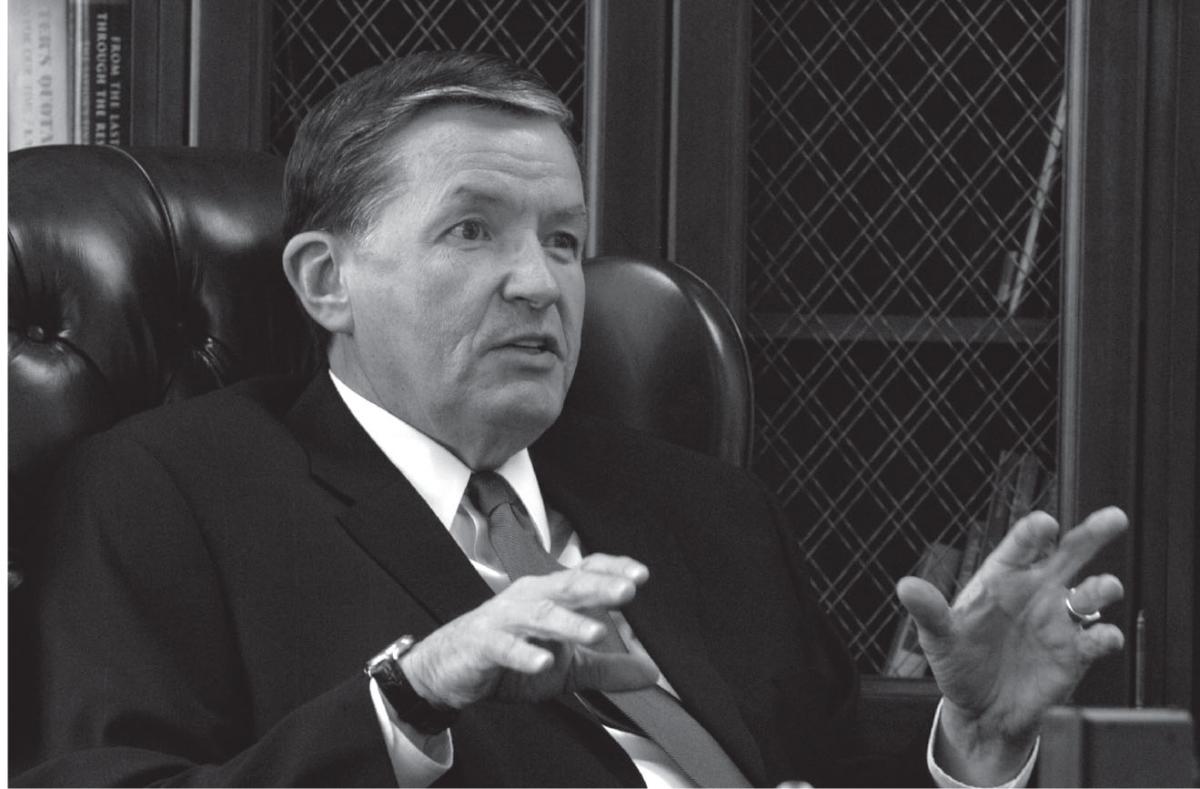
I think faculty members just need to recognize that all of those issues are there. We all deal with dynamic tensions. We want to do well in everything, but we may not have enough strength or may not have whatever we need to accomplish what we need to. I think one of the responsibilities I have in the administration with my colleagues who work here is to try to keep an appropriate balance in terms of all the things we ask people to do and the expectations we have. What I would say to the faculty is, “Look, realize that we ask many things of you and you have a lot to do with what you do; you will never have everything that you would like to have. That will probably be a blessing in your life because you will learn to prioritize, you will learn to be efficient, you will learn to save, you will learn to conserve, and you will learn to do all those things that really are fundamental values for developing a well-balanced Latter-day Saint.”
What role does sacrifice have in the lives of the teachers as they are balancing competing demands?
Sacrifice is a fundamental gospel principle. We know of the Savior’s sacrifice and the Atonement and what that means to us. But we also know that each of us is asked to sacrifice, and most of us have had the sacred opportunity of making sacred covenants that we would sacrifice. Part of the element of sacrifice is that it is sanctified. It is a reminder not only to our Heavenly Father and the Savior but also to ourselves that, yes, there are some things more important than our comfort or our own egocentric needs or wishes.
The trustees recognize that this is a wonderful place and commit tremendous resources here. They also recognize that the needs of Brigham Young University and the Church Educational System can be voracious and relentless. The trustees have the difficult but important responsibility of allocating resources. When you think about the things that go on here at BYU and recognize that many of our Church members live in the developing world where they do not even have opportunities for basic education or for meaningful jobs so they can support their families, be active in the Church, pay their tithing, and send their children on missions, and so forth, then you understand why our prophet, who is also chairman of the board, focuses so much on the Perpetual Education Fund.
Even if there were sufficient resources to do everything, I think it is very clear that the board does not necessarily want people to be at BYU or to be anywhere in Church education because that is where they can make the most money or where their life can be easiest. In fact, I think there is a real advantage in having people make an affirmative decision that yes, I might, in the eyes of the world, do better doing something else, but because I am absolutely committed to the mission of Church education, wherever it is that I am working, I have made the decision to try to qualify to be involved there. That is the element of sacrifice. My job and that of other administrators is to make sure that because people make that commitment and are willing to sacrifice, we do not allow the gap to grow too large between what is possible in other places and what is necessary to keep body and soul of the family together. We need to be sure that gap does not get too wide. I think that sacrifice is an essential element. Someone who does not subscribe to that probably would be happier not being in Church education or at BYU.
You have referred to compensatory blessings that come as we sacrifice and as we serve—the increase in character and the ability to prioritize. What are some of the other compensatory blessings that you have experienced or that others will experience?
Well, there are many. I happen to agree and endorse those words that begin the last verse of the hymn “Praise to the Man”—“Sacrifice brings forth the blessings of heaven.” That was clearly true with the Prophet Joseph, but I think it is true for everyone else who has applied it. Now, we often think of blessings in monetary value or in terms of things. In my view, the greatest blessing that comes from sacrifice is the confirmation of the Spirit that comes when you are doing what you should be doing for the right reasons. The peace that comes from that, the assurance that your life is being lived in a way that is consistent with God’s will for you, and the joy that comes when you recognize that your sacrifice is improving and helping others have a better life—those are tremendous sources of blessings.
All of us have unique and special blessings that come to us in various ways, but I think those are the fundamental kinds of blessings that come. My suggestion is—and I have never had anybody argue with me about this—that if you really make a sacrifice for the right reasons and your heart is there, and then you carefully examine whether you received blessings for it, you will never be able to say, “No, I’ve done it for the right reasons, I have examined it, and I can’t identify the blessings.” People say, “You know, you are right; I have been blessed much more than I could have ever anticipated. I have been repaid.” I have had great blessings as have other people. I think the greatest blessing of all is to recognize the source of the blessings we receive.
We all experience trials in our lives. You have had your own share of trials. What counsel can you give to those who have gone through challenges such as the loss of a loved one?
I think there are many things. I think you trust in the Lord. I learned very early that wonderful little scripture from the third chapter of Proverbs: “Trust in the Lord with all thine heart; and lean not unto thine own understanding. In all thy ways acknowledge him, and he shall direct thy paths” (Proverbs 3:5–6). I think that is true. I think that we sometimes get distracted by the proximate and tend to forget how it fits into the big plan.
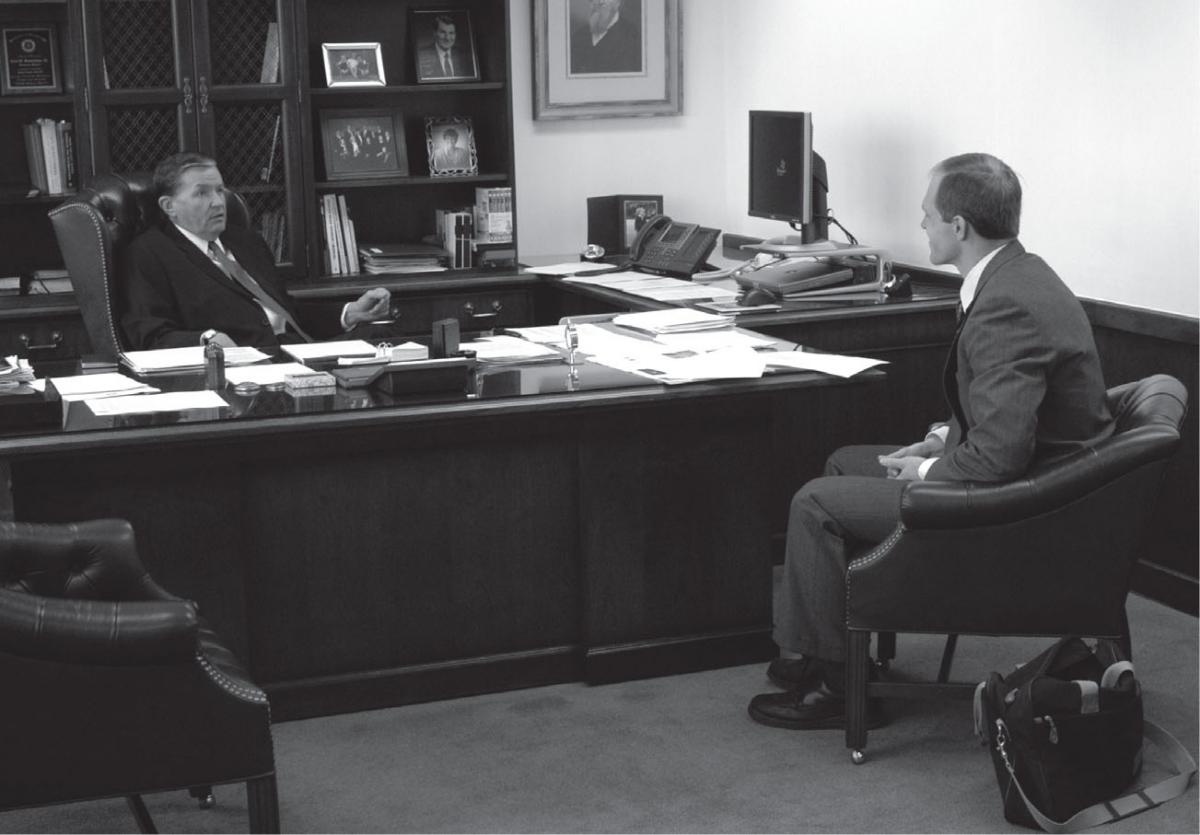
I would just say that I am now old enough to be grateful that many of my prayers have not been answered the way I wanted them answered. There were times when I thought maybe they were not being answered at all. But I have to say that some blessings—both ones that may be obvious publicly but also ones that are very sacred and private—would not have come to me if my life had been led the way I thought I would lead it as a young man. I am thinking about the time I came home from my mission and decided that I understood the plan of salvation; I had been teaching it as a missionary. (I have a nice little letter from some people that I tracted out some years ago who have been just wonderful, and it is exciting to see what has happened to them.) I thought you kept the commandments and lived happily ever after; you did not have any problems. Last night I talked to Rebecca, my adopted daughter. I have two daughters; one is adopted, and one came the usual way. Had my wife and I not had some real heartache and disappointment in having our children come when they did, she would not be my daughter. I probably would not have known her. What a tragedy that would have been! So there is a recognition that the Lord will sustain us—He knows us, He loves us—if we do what we need to do and recognize that trials are part of the gospel. I think we stay on the course even as it veers in unexpected directions, and we then will know that things will eventually work out. One of the great things about the gospel is that if things do not work out in this life, we have time for the Lord to make things right.
Your exercise regimen is somewhat legendary already. Tell us about your routine.
I don’t know if it should be legendary, and I’m not a masochist, but I do enjoy exercising. I enjoy exercising in the morning. I’ve tried it at different times, day and night, and for me it works best first thing in the morning. It gets the blood flowing for the other things I need to do. I am not one who shaves and brushes my teeth and eats my breakfast and reads the paper while I drive, but I do like to multi task. Because I am a bit of a news junkie, I watch various news channels in the morning, and I have them all timed so that I don’t spend any time on commercials. I am a typical male in that I have the remote in my hand and know when to move to other things. I find exercising to be invigorating and relaxing. Over the years when I have had a regular program, I found that it is really very helpful to me.
How do you accomplish so much?
Just do the best you can do. That’s what President Gordon B. Hinckley says. Just plan your day and focus on the things that are most important; and when something more important comes its way, you sometimes just have to put things by the side. I can never do everything I would like to do. I always have a stack of books I would love to read sometime. Sometimes I’m involved in three or four at a time. I find that as I get older, my energy to work late into the night is lessened. Things that I used to think were important are not very important anymore.
In your inaugural address, you quoted Elder Neal A. Maxwell as saying, “LDS scholars can and should speak in the tongue of scholarship, but without coming to prefer it and without losing the mother tongue of faith” (Deposition of a Disciple [Salt Lake City: Deseret Book, 1976], 16). How can teachers and scholars stay well grounded in faith?
I think you have to remember that faith is the first principle of the gospel. We were talking about teaching before. I want to be very careful because I go to different Sunday School classes and so forth. I don’t ever want to be offensive, but sometimes we can get into the situation where we are so excited about something new or unique or different that we get away from the basics. Years ago when I was a fairly new General Authority, I heard President Hinckley say, speaking of the Seventy, “I’m turning the administration of the Church over to you. Now, that’s a great simplification, but I have worked on it all of these years. Now I’m just going to focus on teaching people faith.” He was being partly facetious but also being really very truthful. I use that little quote because thinking about it helps me keep the balance. Elder Maxwell said that in a number of different ways. His discourses, both his public and his private counsel over the years, have been, I think, consistent with that statement.
I think if you remember who you are and what you are about and why you are about it, you will be all right. We do it in different ways. We have different interests, we have different talents, we have different attitudes, and at different stages in our lives we do things in different ways. I never felt that I was violating the basic suggestion Elder Maxwell made when I was teaching medicine, nor did I feel like I was violating it when I was teaching Gospel Doctrine, although my study and my preparation for both of those were very singular. But when I was teaching my medical students, part of my prayer was that I would be an effective teacher. Having prayed about it, I felt obliged to study as hard as I could and to think about ways to be true. Likewise, when I am dealing with things of the Spirit, I believe that if I am going to get help, I need to be rigorous in my academic skills. The fact that I am thinking about faith does not excuse me from thought. The fact that I am thinking about substantive issues in science or education does not excuse me from listening to the promptings of the Spirit.
